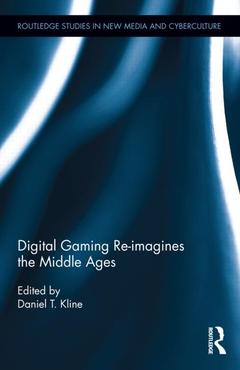Description
Digital Gaming Re-imagines the Middle Ages
Routledge Studies in New Media and Cyberculture Series
Coordinator: Kline Daniel T.
Language: English
Subjects for Digital Gaming Re-imagines the Middle Ages:
Keywords
medieval; game; culture; adaptation; history; World of Warcraft; Dante's Inferno; media; social; translation; video; literature; Klein; Matthew Paris’s Chronica Majora; network; Young Men; Lich King; Game Developers; King Henry III; Deus Vult; Hereford Mappamundi; Dragon Age; Death Knights; Local Contentious Practice; Dante’s Inferno; Assassin’s Creed; Video Game Maps; Medieval Maps; Magic User; Raoul De Cambrai; Dragon Age II; Local Hunt Club; Bird’s Eye; Social Simulation Games; Medieval Elements; Da Vinci Code; Super Mario World; Great Famine; Medieval Fantasy
Publication date: 09-2013
Support: Print on demand
Publication date: 02-2018
· 15.2x22.9 cm · Paperback
Description
/li>Contents
/li>Readership
/li>Biography
/li>
Digital gaming?s cultural significance is often minimized much in the same way that the Middle Ages are discounted as the backward and childish precursor to the modern period. Digital Gaming Reimagines the Middle Ages challenges both perceptions by examining how the Middle Ages have persisted into the contemporary world via digital games as well as analyzing how digital gaming translates, adapts, and remediates medieval stories, themes, characters, and tropes in interactive electronic environments. At the same time, the Middle Ages are reinterpreted according to contemporary concerns and conflicts, in all their complexity. Rather than a distinct time in the past, the Middle Ages form a space in which theory and narrative, gaming and textuality, identity and society are remediated and reimagined. Together, the essays demonstrate that while having its roots firmly in narrative traditions, neomedieval gaming?where neomedievalism no longer negotiates with any reality beyond itself and other medievalisms?creates cultural palimpsests, multiply-layered trans-temporal artifacts. Digital Gaming Re-imagines the Middle Ages demonstrates that the medieval is more than just a stockpile of historically static facts but is a living, subversive presence in contemporary culture.
Introduction: "All Your History Are Belong to Us": Digital Gaming Re-imagines the Middle Ages Daniel T. KlinePart 1: Prehistory of Medieval Gaming 1. The Right to Dream of the Middle Ages: Simulating the Medieval in Tabletop RPGs William J.WhitePart 2: Gaming Re-imagines Medieval Traditions 2. "Best and Only Bulwark": How Epic Narrative Redeems Beowulf the GameCandace Barrington and Timothy English 3. Systematizing Culture in Medievalism: Geography, Dynasty, Culture, and Imperialism in Crusader Kings: Deus Vult Jason Pitruzzello 4. The Portrayal of Medieval Warfare in Medieval: Total War and Medieval 2: Total War Greg Fedorenko 5. Gabriel Knight: A Twentieth-Century Chivalric Romance Hero Angela Tenga Part 3: Case Study 1 – World of Warcraft 6. Coloring Tension: Medieval and Contemporary Concepts in Classifying and Using Digital Objects in World of WarcraftElysse T. Meredith 7. Sir Thomas Malory and the Death Knights of New Avalon: Imagining Medieval Identities in World of WarcraftKristen Noone and Jennifer Kavetsky 8. Accumulating Histories: A Social Practice Approach to Medievalism in High Fantasy MMORPGs Jennifer C. Stone, Peter Kudenov, and Teresa Combs 9. "Awesome Cleavage": The Genred Body in World of Warcraft Kim Wilkins Part 4: Case Study 2 – Dante's Inferno, The Game 10. The Game's Two Bodies, or the Fate of Figura in Dante's InfernoBruno Lessard 11. Courtly e-Violence, Digital Play: Adapting Medieval Courtly Masculinities in Dante’s InfernoOliver Chadwick 12. Shades of Dante: Virtual Bodies in Dante's InfernoTimothy J. Welsh and John T. Sebastian 13. The Middle Ages in the Depths of Hell: Pedagogical Possibility and the Past in Dante's InfernoAngela Jane Weisl and Kevin J. StevensPart 5: Theoretical and Representational Issues in Medieval Gaming 14. We Will Travel by Map: Maps as Narrative Spaces in Videogames and Medieval Texts Thomas Rowland 15. Author, Text, and Medievalism in The Elder Scrolls Michelle DiPietro 16. Technophilia and Technophobia in Online Medieval Fantasy Games Nick Webber 17. The Consolation of Paranoia: Conspiracy, Epistemology, and the Templars in Assassin's Creed, Deus Ex, and Dragon Age Harry J. BrownPart 6: Sociality and Social Media in Medieval Gaming 18. Casual Medieval Games, Interactivity, and Social Play in Social Network and Mobile Applications Serina Patterson
Daniel T. Kline is Professor of English at the University of Alaska, Anchorage, USA.




